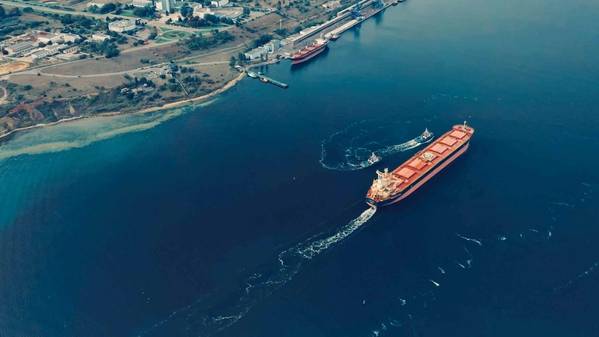
The U.S. and China agreed on Thursday to pause tit-for-tat fees on each other's ships that became a major irritant in the broader trade war between the world's two largest economies and pushed up ocean freight costs.
The move provides a 12-month reprieve on an estimated $3.2 billion annually in fees for large Chinese-built vessels sailing to U.S. ports and was among the trade deals reached in South Korea by U.S. President Donald Trump and Chinese President Xi Jinping.
Early this year, the Trump administration announced plans to levy fees on China-linked ships to loosen the country's grip on the global maritime industry and bolster U.S. shipbuilding.
The so-called Section 301 penalties followed a U.S. probe that concluded China's domination of the global maritime, logistics and shipbuilding sectors was driven by unfair practices.
U.S. Treasury Secretary Scott Bessent said on Fox Business Network on Thursday that the Section 301 action had been put on hold.
The U.S. Trade Representative's office did not immediately comment whether the pause covered other U.S. penalties on non-U.S. auto carriers built outside of China or on ship-to-shore port cranes built in China.
China's Ministry of Commerce said in a statement that the suspension applied to Section 301 penalties "concerning China's maritime, logistics, and shipbuilding sectors." It added that China also will suspend its on countermeasures and fees on U.S.-linked ships.
The fees reportedly have cost ship operators including China-owned COSCO and U.S.-based Matson millions of dollars and disrupted vessel schedules, driving up shipping expenses that eventually will land on consumers, maritime experts warned.
Singapore-based shipper High-Trend International Group said in a statement that the suspension offered immediate, material benefits to the company.
"The suspension removes a long-standing cost and policy overhang that had affected HTCO's maritime logistics and carbon-neutral initiatives," the High-Trend said. "This development is expected to significantly reduce cross-border shipping costs, improve cash-flow stability, and strengthen investor confidence in HTCO's growth strategy."
REDUCED ORDERS
Bessent said just the threat of the Section 301 tariffs was enough to reduce demand for China-built ships.
"Chinese shipbuilders have seen substantial diminution or decreases in their order books," Bessent said.
Orders for Chinese ships have fallen from last year as part of an overall decline this year. However, data shows that China continues to dominate ship orders.
Chinese shipyards captured 53% of all global ship orders by tonnage during the first eight months of 2025, according to a the Center for Strategic and International Studies (CSIS) analysis of S&P Global data.
ICS RESPONDS
The International Chamber of Shipping (ICS) welcomes the agreement. ICS has been involved in consultations with the United States Trade Representative (USTR) since the beginning of the Section 301 investigation, and the government of China, and the organization looks forward to receiving confirmation on these reports and further details.
The reports of the U.S.’ agreement to suspend the Section 301 port fees on China’s maritime, logistics and shipbuilding industries by one year, and the agreed reciprocal suspension of China’s countermeasures targeting US linked ships, is a welcome and positive development, said ICS in a statement.
ICS supports the ambition to increase U.S. shipbuilding capacity and to make the United States Shipbuilding industry strong, as additional commercial tonnage strengthens the global maritime sector’s efficiency and competitiveness. However, the port fees imposed by the USTR on 14 October 2025, and subsequently by China as countermeasures to U.S. linked ships, has already posed significant challenges and disruptions for the shipping industry and global trade.
“At ICS we strongly advocate for the need for shipping to be able to move trade freely and efficiently, and remain committed to working collaboratively with all administrations and international partners to avoid any disruptions to the flow of global trade.”
(Reuters and staff)



